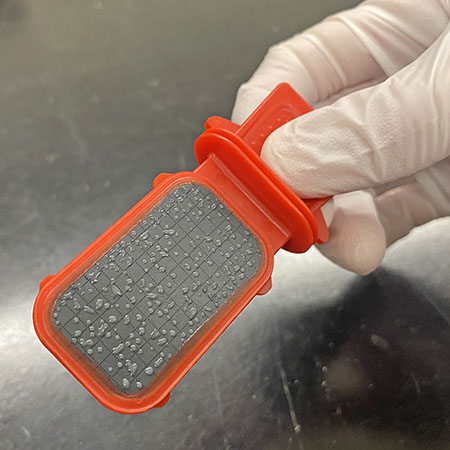
Health of patients, providers focus of research into dental water quality
Partnership between college, communities will track water testing and quality assurance procedures in dental clinics over a six-month period.
A partnership between College of Dentistry researchers and dental clinics in both Saskatoon and several other Saskatchewan communities is expected to offer insight into the quality of water used during dental procedures and will help inform best practice and regulatory requirements.
The research will see water quality testing performed at selected clinics during a six-month period to gather data about the quality of water emitted from dental unit waterlines (DUWL).
“Water utilized during dental procedures must meet drinking water standards and public health measures in Saskatchewan require annual dental unit waterline testing,” said Dr. Michelle Siqueira (DDS, DSc), the study’s co-principal investigator and scientific director of the college’s Sterilizer and Waterline Monitoring Service (SWMS).
“We hypothesize that more frequent testing that allows dental professionals to monitor the water utilized in dental treatment more often, and then intervene quickly after a failed test result, has the potential to protect patients and dental team members from acquiring infections.”
The project, Water quality testing at selected urban and rural dental clinics in Saskatchewan - assessing trends over six months, will perform bi-weekly testing at two college-operated dental clinics in Saskatoon and three First Nation dental clinics that are part of the college’s outreach clinic network. The research is funded by a Saskatchewan Health Research Foundation Align Grant.
 The research will track the quality of each clinic’s tap water as well as the water emitted by DUWLs during dental procedures at the five clinics partnering in the study. Samples will be collected by clinic staff and sent to the SWMS for analysis. In case of a failed water quality test, researchers will be able to assess the impact of remediation practices, including collecting information on DUWL daily use and sampling procedures. A comparative data analysis will allow researchers to analyze trends and communicate information to stakeholders.
The research will track the quality of each clinic’s tap water as well as the water emitted by DUWLs during dental procedures at the five clinics partnering in the study. Samples will be collected by clinic staff and sent to the SWMS for analysis. In case of a failed water quality test, researchers will be able to assess the impact of remediation practices, including collecting information on DUWL daily use and sampling procedures. A comparative data analysis will allow researchers to analyze trends and communicate information to stakeholders.
As part of the effort, health and dental representatives from the Shoal Lake Cree Nation, Red Earth Cree Nation, and Big River First Nation will play a significant role during the project through regular water sampling, information on infection control procedures, and, in the case of a failed test, conducting required remediation to ensure water quality.
The project is building upon a well-established relationship between the respective First Nations and the college through providing dental care in these communities. The Big River First Nation and Prince Albert Grand Council (PAGC) are providing support in the form of clinic staff time and additional in-kind contributions.
“We believe there are benefits for our communities in partnering on this important project,” said Shirley Woods, the PAGC’s director of Health and Social Development. “The health and well-being of our community membership is a high priority for the PAGC, and each piece of additional information we can gain on factors that could impact the health and well-being of our communities is important to us.
“Water quality for residents of First Nations in Canada is a topic of interest for our communities, and this project provides an excellent opportunity to collect longer-term data about the water in selected communities.”
Marlene Morin, health director for the Big River First Nation, said by partnering with the research team the First Nation hopes to gain insights into tap water quality as well as from the dental professional perspective in terms of water quality during procedures.
“We can use this information as an additional measure to safeguard the health of our community membership,” Morin said.
Dr. Amrinderbir Singh (DDS, MPH), a study co-principal and the college’s director of Inclusive Community Care, said the college has strong partnerships with health directors and community leaders in First Nation communities where the college has outreach clinics.
“This is a unique opportunity to extend this relationship to encompass the important issue of water quality in dental clinics when it comes to providing safe care to patients. These varied perspectives will be integrated into the project, especially in communication of results to Indigenous community stakeholders,” Singh said.
The partner First Nations will gain preliminary insights into the tap water quality in their communities during the six-month study period. The data and any release of results will be under each community’s control and consultations with health directors and other representatives will ensure the findings are communicated in a respectful, accessible manner and are useful to the community.
Researchers expect the collection period to begin in April with data analysis taking place in late fall 2023. Results and information will be shared with the participating communities later in the year or early 2024, and the research team will look for opportunities to expand the project to additional locations.
Siqueira believes the information gathered during the project could affect how the dental profession views and responds to water testing and quality assurance procedures and how that can benefit patients.
“This line of research is pioneering in Saskatchewan. For the aspect of testing the DUWLs’ water quality, this research concerns the health all Saskatchewan residents receiving dental care,” she said. “The risk of biofilm being present in the water used in dental treatment is unsettling for all, and it deserves investigation to ensure that regulatory requirements are sufficient in protecting patients and practitioners exposed to water from DUWLs.
“By enhancing oral health care professional’s knowledge and understanding of effective infection prevention and control, dental clinics will be able to ensure the most up-to-date protocols are in place and being closely monitored to mitigate the risk of cross-contamination or exposure to contaminants in water during treatments. They will be able to act quickly and knowledgeably when a quality assurance infection control test fails, safeguarding patient health and safety.”

